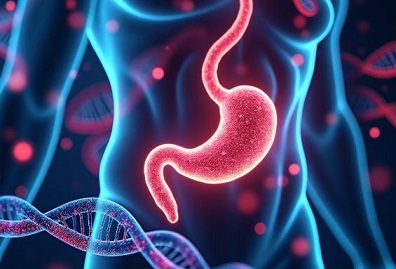Sebastian Lavoie Fact checked by:Thailand Medical News Team Sep 05, 2024 7 months, 1 week, 4 days, 10 hours, 18 minutes ago
Cancer News:
Introduction to Gastric Cancer and Epigenetics
Gastric cancer (GC) continues to be a formidable challenge in global healthcare due to its high mortality rates and complex pathophysiology. Recent advancements in molecular biology have highlighted the significance of epigenetic modifications - heritable changes in gene expression that do not alter the DNA sequence - in the development and progression of various cancers, including Gastric cancer (GC). This
Cancer News report explores the latest research into the role of epigenetic mechanisms, such as DNA methylation, RNA interference, and the function of noncoding RNAs, in GC. Researchers from Babes-Bolyai University and Iuliu Hatieganu University of Medicine and Pharmacy in Cluj-Napoca, Romania, have contributed significantly to this body of knowledge.
 The role of epigenetic modifications in gastric cancer
The Role of Long Noncoding RNAs (lncRNAs) in Gastric Cancer
The role of epigenetic modifications in gastric cancer
The Role of Long Noncoding RNAs (lncRNAs) in Gastric Cancer
Among the various epigenetic factors, long noncoding RNAs (lncRNAs) have emerged as crucial regulators of gene expression in GC. The study delves into the findings that lncRNAs like LINC00853 and LINC01266 are significantly overexpressed in GC tissues, contributing to tumor progression by facilitating the movement, invasion, and proliferation of cancer cells. A previous study identified LINC00853 as a key player in gastric cancer, showing that its overexpression correlates with more aggressive tumor behavior.
In addition, LINC01266, transcribed from the 1p35.2 genomic region, a known risk locus for gastric cancer, was found to be markedly elevated in GC samples compared to normal tissues. This suggests that LINC01266 could serve as a novel biomarker or therapeutic target in GC. The research underscores the critical role that lncRNAs play in the epigenetic landscape of GC, affecting gene regulation and cancer pathophysiology.
Circular RNAs (circRNAs) and Their Impact on Gastric Cancer
Recent studies have also focused on the role of circular RNAs (circRNAs) in gastric cancer. It was previously found that circRHOT1 is expressed at significantly higher levels in GC tumors than in adjacent nontumor tissues. The knockdown of circRHOT1 led to a reduction in cell growth and promoted ferroptosis - a type of programmed cell death - in gastric cancer cells. This highlights the potential of circRHOT1 as a therapeutic target in GC treatment.
Further research revealed that circRHOT1 facilitates the recruitment of lysine acetyltransferase 5 (KAT5), promoting the acetylation of histone H3, which in turn enhances the transcriptional activity of the glutathione peroxidase 4 (GPX4) gene. Overexpression of KAT5 and GPX4 was shown to counteract the antiproliferative effects induced by the depletion of circRHOT1, suggesting a complex interplay between these molecules in gastric cancer.
m6A RNA Methylation: A Critical Epigenetic Modification
One of the most significant epigenetic modifications identified in GC is N6-methyladenosine (m6A) RNA methylation, which plays a crucial role in mRNA processing,
including splicing, export, degradation, and translation. Alterations in m6A modification patterns have been linked to cancer progression, making it a potential target for therapeutic intervention.
A past study demonstrated that the fat mass and obesity-associated protein (FTO), an m6A demethylase, promotes the proliferation of GC cells by interacting with circFAM192A, thereby stabilizing the leucine transporter solute carrier family 7 member 5 (SLC7A5). This interaction enhances leucine uptake, which activates the mTOR signaling pathway, a key driver of cancer cell growth. These findings underscore the intricate relationships among m6A modification, FTO activity, and gastric cancer progression.
Targeting Epigenetic Mechanisms for Gastric Cancer Treatment
The exploration of epigenetic mechanisms has opened new avenues for the development of targeted therapies in GC. For instance, EZH2, a component of the polycomb repressive complex 2 (PRC2), has been shown to play a significant role in the trimethylation of histone H3, leading to gene silencing in GC. The inhibition of EZH2 and its interactions with lncRNAs offers a promising strategy for gastric cancer treatment.
In addition, the therapeutic potential of targeting noncoding RNAs is becoming increasingly evident. Antisense oligonucleotides, small interfering RNAs (siRNAs), and CRISPR-based technologies are being explored as methods to inhibit the function of oncogenic lncRNAs or restore the expression of tumor-suppressive noncoding RNAs. These approaches could improve the effectiveness of existing therapies and enhance patient outcomes by addressing the molecular drivers of gastric cancer.
Key Findings and Implications for Future Research
The ongoing research into the epigenetic regulation of gastric cancer continues to reveal the complex molecular interactions that underlie cancer development and progression. Key findings from recent studies include:
-The identification of lncRNAs such as LINC00853 and LINC01266 as significant contributors to gastric cancer pathophysiology.
-The discovery of circRHOT1's role in promoting gastric cancer cell growth and survival, making it a potential target for therapy.
-The critical role of m6A RNA methylation in regulating mRNA processing and cancer progression.
These insights pave the way for the development of novel diagnostic markers and therapeutic strategies aimed at improving patient outcomes. As research progresses, the integration of genetic and epigenetic considerations will be essential for advancing the field of gastric cancer treatment.
Conclusion
The study of epigenetic mechanisms in gastric cancer is rapidly evolving, offering new perspectives on the molecular underpinnings of this deadly disease. This article has highlighted the critical roles of lncRNAs, circRNAs, and m6A RNA methylation in GC pathogenesis. The findings suggest that targeting these epigenetic factors could lead to innovative therapies that improve patient outcomes and reduce the global burden of gastric cancer.
The study findings were published in the peer-reviewed journal: Biomedicines.
https://www.mdpi.com/2227-9059/12/9/2001
For the latest
Cancer News, keep on logging to Thailand Medical News.
Read Also:
https://www.thailandmedical.news/news/the-phytochemical-erianin-found-in-dendrobium-orchids-shows-promise-in-fighting-gastric-cancer
https://www.thailandmedical.news/news/smarcd3-a-key-player-in-gastric-cancer-progression
https://www.thailandmedical.news/news/galectin-1-s-role-in-gastric-cancer
https://www.thailandmedical.news/news/pd-l1-and-gastric-cancer
https://www.thailandmedical.news/news/human-circular-rna-hsa-circ-0000231-can-be-used-as-a-tumor-biomarker-for-gastric-cancer
https://www.thailandmedical.news/news/herbs-and-phytochemicals-extracts-from-rhizomes-of-atractylodes-macrocephala-koidz-baizu-can-help-in-gastric-cancer
